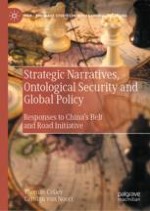Strategic Narratives, Ontological Security and Global Policy provides a pathbreaking account of why some states successfully convince others to join their policy initiatives, and why others fail. Examining China’s Belt and Road Initiative and COVID-19, Thomas Colley and Carolijn van Noort argue that strategic narratives can help persuade states to join global policy initiatives if they convincingly promise audiences material gain while avoiding undermining their ontological security. They make their case by analysing eight diverse countries: India, Italy, Kazakhstan, Mexico, the Maldives, the Netherlands, the UK and the USA.
Theoretically novel and global in scope, this book provides a compelling explanation of how strategic narratives can help achieve the global policy coordination needed to confront vital challenges in contemporary international relations. The proposed strategic narrative buy-in framework is applicable to many global policy issues, be it promoting trade and infrastructure projects, mitigating climate change or managing pandemics.
